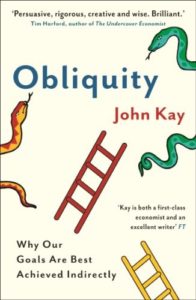
The skill of problem solving frequently lies in the interpretation and reinterpretation of high-level objectives.
In this book John Kay argues that “the best way to achieve any complex or broadly defined goal, from happiness to preventing forest fires, is the indirect way. We can learn how to achieve our objectives only through a gradual process of risk taking and discovery”. Kay refers to this indirect approach as obliquity. In this book Kay shows us how this idea manifests itself in many aspects of life.
Oblique approaches recognise that complex objectives tend to be imprecisely defined and contain many elements that are not necessarily or obviously compatible with each other, and that we learn about the nature of the objectives and the means of achieving them during a process of experiment and discovery. Oblique approaches often step backwards to move forwards.
We incline to see history through the lives of great men. That inclination blinds us to the real complexity of politics, business and finance. So we find intentionality and design where there is only chance and improvisation; directness where there is obliquity.
It is not given to human beings – happily for them, otherwise life would be intolerable – to foresee or predict to any large extent the unfolding of events. In one phase men seem to have been right, in another they seem to have been wrong. Then again, a few years later, when the perspective of time has lengthened, all stands in a different setting. There is a new proportion. There is another scale of values. History with its flickering lamp stumbles along the trail of the past, trying to reconstruct its scenes, to revive its echoes. – Winston Churchill
In an uncertain environment, what is consistent is subjective, and it is possible to have too much consistency or too little. Too much consistency is seeing situations as similar when they are in fact, different…Too little consistency is pragmatism without structure or discipline. The world is too complex and uncertain for consistency to be possible or even a well defined concept. The favourite poet of the Dead Poets Society, Walt Whitman, appreciated the dilemma: “Do I contradict myself? Very well then, I contradict myself. I am large, I contain multitudes.” F. Scott Fitzgerald expressed a similar thought: “The test of a first-rate intelligence is the ability to hold two opposed ideas in the mind at the same time and still retain the ability to function.” The oblique decision maker, the fox, is not hung up on consistency and frequently holds contradictory ideas simultaneously.
Mostly, we actually solve problems obliquely. Our approaches are iterative and adaptive. We make our choices from a limited range of options. Our knowledge of the relevant information, and of what information is relevant, is imperfect. Different people will form different judgements in the same situation, not just because they have different objectives but because they observe different options, select different information and assess that information differently: and even with hindsight it will often not be possible to say who was right and who was wrong. In a necessarily uncertain world, a good decision doesn’t necessarily lead to a good outcome, and a good outcome doesn’t necessarily imply a good decision or a capable decision maker. The notion of a best solution may itself be misconceived. The skill of problem solving frequently lies in the interpretation and reinterpretation of high-level objectives.
I never, indeed, wavered in the conviction that happiness is the test of all rules of conduct, and the end of life. But I now thought that this end was only to be attained by not making it the direct end. Those only are happy (I thought) who have their minds fixed on some object other than their own happiness; on the happiness of others, on the improvement of mankind, even on some art or pursuit, followed not as a means, but as itself an ideal end. Aiming thus at something else, they find happiness by the way. – John Stuart Mill
What is the highest good in all matters of action? As to the name, there is almost complete agreement, for uneducated and educated alike call it flourishing, and make flourishing identical with the good life and successful living. They disagree, however, about the meaning of flourishing. – Aristotle.
He is in this, as in many other cases, led by an invisible hand to promote an end which was no part of his intention. By pursuing his own interest he frequently promotes that of society more effectually than when he really intends to promote it. – Adam Smith
Our objectives are often complex.
The world is not only risky but also inevitably uncertain.
The world is complicated, and the simplification we make in trying to deal with it is often misleading. (Think about the objective of going from Paddington to Lancaster Gate in London. Follow the London tube map, by taking the underground train a couple stops down the circle line first, then traveling two stop East on the central line to Lancaster Gate, whiles it is shorter and faster to walk. Tube map simplifies the underground train networks and travel planning for us, but can be very misleading.)